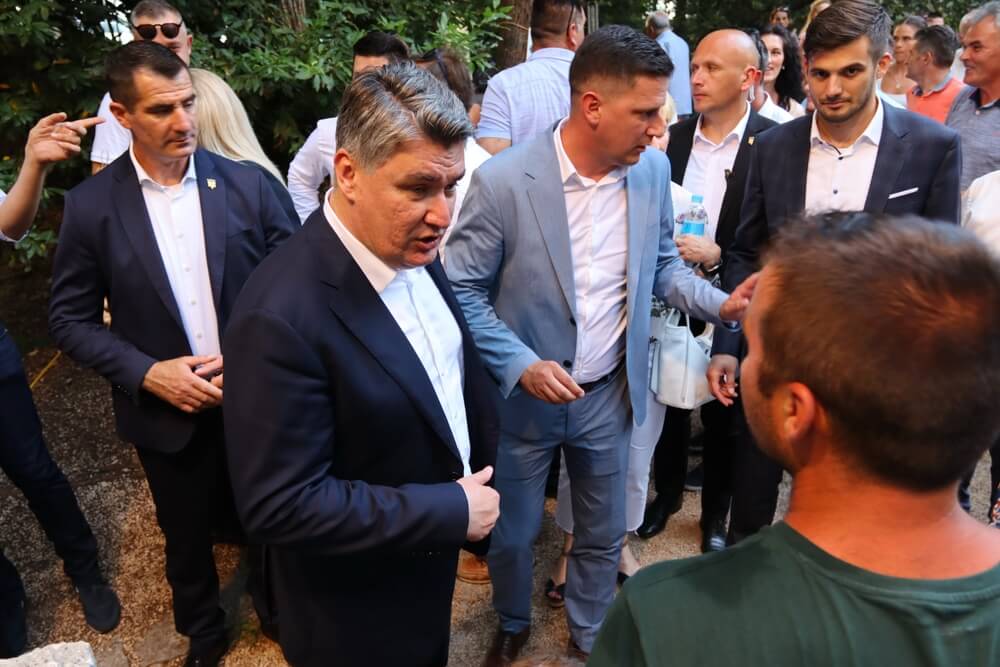The youngest member of the EU, Croatia, will spend the whole of 2024 in a pre-election atmosphere, without many chances to deal with the burdens of internal corruption, foreign policy wanderings, and boosting the economy.
Tomorrow's parliamentary elections will constitute just one-third of the super-election year in this Mediterranean member state of the EU and NATO. The election of deputies to the European Parliament will follow in June, and at the very end of the year, the presidential elections will follow.
The elections are marked by a major constitutional dispute between the 2 dominant political parties: the Croatian Democratic Union (HDZ) of Prime Minister Andrej Plenković, fighting for a third term, and the Social Democratic Party (SDP) of President Zoran Milanović.
Even though the Constitutional Court challenged President Milanović's right to participate in the SDP campaign, he refused to resign from the position of head of state and is active in helping his party return to power after 8 years.
Tomorrow's elections will not eliminate this significant institutional conflict between the head of state on the one hand and the government and the Constitutional Court on the other, leaving a dangerous legal precedent in Croatia that could be repeated with even more severe consequences in this young democracy.
Advantage of pro-EU conservatives
The ruling moderate conservatives of Prime Minister Plenković have approximately a 10% lead over the Social Democrats (32% to 22%) in the pre-election polls.
However, post-election agreements regarding the formation of broad coalitions will be crucial, given that no group could count on a majority of 76 deputies in the 151-seat parliament.
Both of Croatia's principal parties keep EU and NATO membership at the top of their policies, reflecting broad population support for membership in these organisations.
If the centre-right HDZ succeeds in forming a majority again, Croatia will preserve a stable pro-EU and pro-NATO
If the centre-right HDZ succeeds in forming a majority again, PM Plenković could count on a third consecutive mandate, and in that case, Croatia will preserve a stable pro-EU and pro-NATO orientation without the influence of Eurosceptics.
After the wars in the former Yugoslavia in the 1990s, Croatia relatively rapidly joined NATO (2009) and the EU 4 years later. Frequent changes in governments between HDZ conservatives and Social Democrats did not disturb the national focus on entering Euro-Atlantic integration.
Moreover, Croatia entered the Schengen area on January 1, 2023, long before Romania and Bulgaria, which became EU members 6 years earlier. Also, since the beginning of last year, Croatia has become part of the euro zone and introduced the euro.
Controversial president
However, a change of government in Zagreb in the event of the Social Democrats winning carries with it the risk of the unpredictable policy of the current president Milanović, who, in the event of victory, will become PM.
His deliberate violation of clear constitutional restrictions on campaigning and running for prime minister while still holding the presidency makes Milanović a disruptive factor for Croatia's young democracy.
Even more, his views regarding the Russian aggression against Ukraine, the entry of Sweden and Finland into NATO, and especially his controversial positions regarding the crises in the Balkan region carry the risk that Croatia, under his leadership, could correct its previous foreign policy.
"Ukraine is not an ally of Croatia" - President Zoran Milanović
Maintaining a constant confrontation with PM Plenković, President Milanović has expressed great reservations in the past 2 years, including open opposition to support for Ukraine. "It is clear that Crimea will never be part of Ukraine again"... "It is crazy to think that Russia could be defeated in a conventional war"... "Ukraine is not an ally of Croatia"... "The military aid that the West sends to Ukraine is "in vain". With these and similar statements, he profiled himself as one of the strongest opponents of the EU and NATO's policy of broad support for Ukraine's defence against Russian aggression.
He showed political destructiveness not only verbally but also by trying to block the entry of Finland and Sweden into NATO, demanding in return concessions from the West regarding the problematic election law in neighbouring Bosnia and Herzegovina, where Croats are one of the 3 constituent nations.
Assessments that President Milanović runs the risk of leading Croatia to the pro-Russian camp in the EU also stem from his very close ties with the leader of the Serbs in BiH, Milorad Dodik, a distinctly pro-Russian politician.
Introduction to European elections
If there are no big surprises in tomorrow's elections, forming a majority in the future Croatian parliament will be a difficult task for both dominant political groups.
Even though the conservatives from the HDZ have significantly better chances, they will have to compromise as before with the smaller parties of the right, some of which are extreme, and see their allies in the anti-EU nationalists across Europe.
The Social Democrats of President Milanović have as potential partners extreme-left parties and movements, advocates of populism, and anti-systemic policies.
 Complicated post-election arrangements will be difficult, given that they will take place under the conditions of a new pre-election campaign for the European Parliament in early June - President Zoran Milanović
Complicated post-election arrangements will be difficult, given that they will take place under the conditions of a new pre-election campaign for the European Parliament in early June - President Zoran Milanović
Complicated post-election arrangements will be difficult, given that they will take place under the conditions of a new pre-election campaign for the European Parliament in early June.
The group that is more successful in tomorrow's elections for the national parliament and in the agreements about the government that will follow could be considered a convincing favourite in the European elections in June.
While the leaders will be busy with campaigns and coalition agreements, Croatia will take a break from solving its major problems, as it is the fifth country in the EU with the most widespread corruption and an economy that has only reached 75% of the EU average.